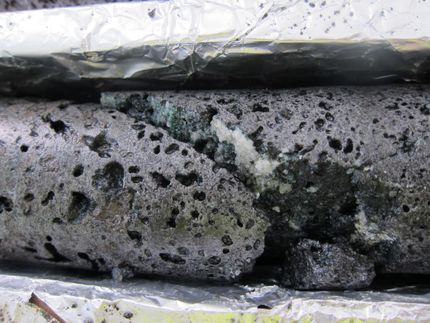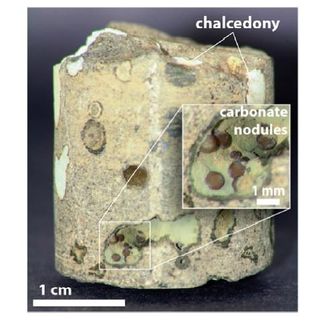Why food quality will suffer with rising CO2
For the first time, a field test has demonstrated that elevated levels of carbon dioxide inhibit plants' assimilation of nitrate into proteins, indicating that the nutritional quality of food crops is at risk as climate change intensifies.
Findings from this wheat field-test study, led by a UC Davis plant scientist, will be reported online in the journal Nature Climate Change.
"Food quality is declining under the rising levels of atmospheric carbon dioxide that we are experiencing," said lead author Arnold Bloom, a professor in the Department of Plant Sciences.
"Several explanations for this decline have been put forward, but this is the first study to demonstrate that elevated carbon dioxide inhibits the conversion of nitrate into protein in a field-grown crop," he said.
The assimilation, or processing, of nitrogen plays a key role in the plant's growth and productivity. In food crops, it is especially important because plants use nitrogen to produce the proteins that are vital for human nutrition. Wheat, in particular, provides nearly one-fourth of all protein in the global human diet.
Many previous laboratory studies had demonstrated that elevated levels of atmospheric carbon dioxide inhibited nitrate assimilation in the leaves of grain and non-legume plants; however there had been no verification of this relationship in field-grown plants.
Wheat field study
To observe the response of wheat to different levels of atmospheric carbon dioxide, the researchers examined samples of wheat that had been grown in 1996 and 1997 in the Maricopa Agricultural Center near Phoenix, Ariz.
At that time, carbon dioxide-enriched air was released in the fields, creating an elevated level of atmospheric carbon at the test plots, similar to what is now expected to be present in the next few decades. Control plantings of wheat were also grown in the ambient, untreated level of carbon dioxide.
Leaf material harvested from the various wheat tests plots was immediately placed on ice, and then was oven dried and stored in vacuum-sealed containers to minimize changes over time in various nitrogen compounds.
A fast-forward through more than a decade found Bloom and the current research team able to conduct chemical analyses that were not available at the time the experimental wheat plants were harvested.
In the recent study, the researchers documented that three different measures of nitrate assimilation affirmed that the elevated level of atmospheric carbon dioxide had inhibited nitrate assimilation into protein in the field-grown wheat.
"These field results are consistent with findings from previous laboratory studies, which showed that there are several physiological mechanisms responsible for carbon dioxide's inhibition of nitrate assimilation in leaves," Bloom said.
3 percent protein decline expected
Bloom noted that other studies also have shown that protein concentrations in the grain of wheat, rice and barley — as well as in potato tubers — decline, on average, by approximately 8 percent under elevated levels of atmospheric carbon dioxide.
"When this decline is factored into the respective portion of dietary protein that humans derive from these various crops, it becomes clear that the overall amount of protein available for human consumption may drop by about 3 percent as atmospheric carbon dioxide reaches the levels anticipated to occur during the next few decades," Bloom said.
While heavy nitrogen fertilization could partially compensate for this decline in food quality, it would also have negative consequences including higher costs, more nitrate leaching into groundwater and increased emissions of the greenhouse gas nitrous oxide, he said.
Organizations
Other news from the department science

Get the chemical industry in your inbox
By submitting this form you agree that LUMITOS AG will send you the newsletter(s) selected above by email. Your data will not be passed on to third parties. Your data will be stored and processed in accordance with our data protection regulations. LUMITOS may contact you by email for the purpose of advertising or market and opinion surveys. You can revoke your consent at any time without giving reasons to LUMITOS AG, Ernst-Augustin-Str. 2, 12489 Berlin, Germany or by e-mail at revoke@lumitos.com with effect for the future. In addition, each email contains a link to unsubscribe from the corresponding newsletter.




















































